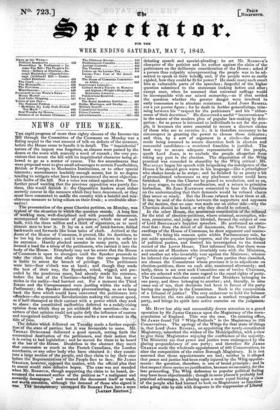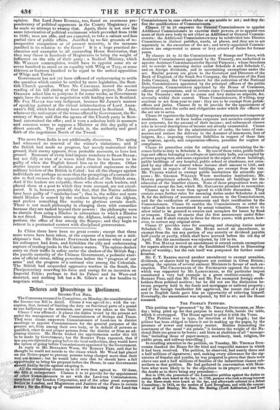NEWS OF THE WEEK.
THE rapid progress of more than eighty clauses of the Income-tax Bill"through the Committee of the Commons on Monday was a fitting sequel to the vast amount of talk on defects of the measure, _before the House came to handle it in detail. The "inquisitorial" nature of the impost was forgotten, as clauses were passed by the dozen or the score with scarcely a word of remark ; the very pro- visions that invest the bill with its inquisitorial character being al- lowed to go as a matter of course. The few amendments that were prOposed went to give small advantages to certain Fundholders, British or Foreign, to Mechanics Institutions, or to other special interests; amendments laudably enough meant, but in no degree tending to mitigate what have been pronounced the most objection- able faults of the bill. Not a voice was raised against them. Were further proof wanting that the previous opposition was purely fac- tious, this would furnish it : the Opposition leaders must either secretly concur in the measure which They have denounced, or they must have consented to saddle the country with a hateful and mis- chievous measure to bring odium on their rivals ; a creditable alter- native!
The presentation of the great Chartist petition, on Monday, was
typical of the situation in which the question stands. A long line of working men, well-disciplined and with peaceful demeanour, accompanied their statement of grievances ; which was of such bulk, with the three million and a third of signatures, as to need sixteen men to bear it. It lay on a sort of hand-barrow, folded backwards and forwards like loose bales of cloth. . Arrived at the doors of the House of Commons, it proved, like its doctrines, to be too big for admission ; and it was taken to pieees in order to its entrance. Hastily plucked asunder in many parts, each bit formed a load for a troop of the petitioners, who carried it into the body of the House. Everybody may not be aware that the House of Commons is open to strangers until the Speaker proceeds to ttake the chair, but that after that time the strange intruder is liable to arrest for breach of privilege. The petitioners were late—four o'clock was at hand ; and though they made the best of their way, the Speaker' robed, wigged, and pre- ceded by the ponderous niace, bad already made his entrance, before the last of the Chartists—bawling for his hat, lost or stolen in the melee—had hurried out. For a moment the Third Estate and the Unrepresented were jostling within the walls of Parliament ; the Speaker discreetly procrastinating, so as to keep back the form which would have converted the petitioners into offenders—the systematic Revolutionists making the utmost speed, as if half-dismayed at their centact with a power which they seek to share : the constituted authorities deferred to a rudely rising opinion from which they as yet withhold their sanction—the as- serters of that opinion could not quite defy the influence of custom and recognized authority. The scene marks a new advance in the tide of time.
The debate which followed on Tuesday made a further exposi- tion of the state of parties; but it was favourable to none. Mr. THOMAS DUNCOMBE delivered a Good speech, setting forth the economical destitution of the petitioners, and their notion that it is owing to bad legislation ; and he moved for them to be heard at the bar of the House. Doubtless in the abstract they merit that concession as much as the French Canadians, the London merchants, or any other body who have obtained it : they consti- tute a large section of the people, and they claim to lay their case before the Representatives of the People face to face. Sir JAMES GRAHAM, however, opposed the motion, with the official plea that to assent would raise delusive hopes. The case was not mended When Mr. ROEBUCK though supporting the claim to be heard, de- nounced the assumed author of the petition as " a malignant and cowardly demagogue," and treated the document itself as trash, not worth attention, although the demand of those who signed it was. The inconsistency entrapped Sir Romer PEEL into a mere debating speech and special-pleading : he set Mr. ROEBUCK'e. character of the petition and its author against the claim of the-
petitioners on the deliberate consideration of the House ; asked if a person thus culpably misrepresenting the people was to be ad- mitted to speak in their behalre and, if the people were so easily cajoled, how they could be fit for power ? He made many such smart hits at vulnerable parts of the speeches ; forgetful of the higher question submitted to the statesman looking before and,Jt-
except once, when he assumed that universal suffrage would be incompatible with our mixed monarchy,—as if that settled._ the question whether the greater danger were involved ia early concession or in absolute resistance. Lord Jolts Rusimr. cut a yet poorer figure ; for he dealt in feebler generalizings, trim- ming between his " respect for the petitioners" and his " abhor- rence of their doctrines." He discovered a useful " inconvenience" in the nature of the modern plan of popular law-making by dele- gation : for as power is intrusted to individuals to act for the peo- ple, it becomes the more essential to secure a discreet choice of those who are to exercise it ; it is therefore necessary to be circumspect in granting the power to choose those delegates; and thus, by a sort of argument in a circle—the present mode being assumed to secure discretion both in electors and successful candidates—a restricted franchise is justified. The best way to secure adequate representation of the people, quoth Lord Joniv, is to exclude the people altogether frorn taking any part in the election. The disquisition of the Whig practical was exceeded in absurdity by the Whig critical : Mr. MACAULAY began his speech with bespeaking the indulgence of the House if he should grow warm in his language—like a prizefighter' _who shakes hands as he strips ; and he finished by as pretty a bit of premeditated vehemence as any playhouse ranter could have furnished. From the Charter he passed to revolution, and so op,. by easy stages, to national confiscation, and a return to primitive .barbarism. Sir JOHN Eisrisors Consented to hear the Chartista on the understanding tha:t their demands would be refused charm They never so wisely. But the House refused to her them at all. It may be said of the debate betWeenthe Supporters and opposers of the motion, that no case was made out on either side—why the Chartists should be heard, or why they should be refused. In the other House, the monstrous constitution of the tribunal for the trial of election-petitions where criminal, accomplice, witi- ness, prosecutor, and judge are election-petitions, formed the subject of one of Lord BROUGHAM 's happiest speeches. He performed an orate!. rical feat : from the driest of all documents, the Votes and Pro-
ceedings of the House of Commons, be drew aignment'ancramise& meat. To bring his reasons, quite. within, Parliamentary rule, he put aside speeches, newspaper-reports, and the popular knowledge
of political parties, and limited his investigation to the formal record of the Lower House. That informed him that there were a certain set of Members who invariably vote-wit. the Ministers,. and another set who invariably, vote against' the Ministers; whence he inferred the existence of "party." From parties thns classified„ are chosen the Committees whose province it is to adjudicate on election-petitions, three on each side, nominated alternately ; and, lastly, there is set over each Committee one of twelve Chairmen„ who are selected with the same regard to the equal rights of party. The Committee therefore consists of four Members belonging to- one party, and three belonging to another ; and, literally, in nine cases out of ten, their decisions had been in favour of the party having the majority in the Committee. Such is the composition of a tribunal of justice! The very endeavour to hold the balance even betwixt the two sides constitutes a marked recognition of party, and brings its spirit into active exercise on the Judgment.- seat.
Mr. Herr has ably and successfully drawn attention to a grand operation by Sir JAMES GRAHAM upon the Magistracy of the town- population of England. This was the case. On entering office,. Sir JAMES found 743 "Whig-Radicals" in the Magistracy to 226 -Conservatives. The apology of the Whigs for that state a things is, that Lord JOHN RUSSELL, on appointing the newly-constituted Magistracy,- consulted the wishes' of the Municipalities, with a view to give thbm Magistrates enjoying the confidence of the majority. The Ministers say that peace and justice were endangered by the glaring preponderancy of one party ; and therefore Sir JAMES GRAHAM wade the wholesale appointment of 400 Conservatives, to alter the composition of the entire Borough Magistracy. It is not asserted that those appointments are bad; neither is it alleged that peace and justice had been really injured by the Whig appoint- ments: the question, therefore, is one of broad principle ; and in that respect there seems no justification, because no necessity, for the late proceeding. The Whig deference to popular political feeling may have been objectionable ; though in some places it probably had practical advantages, in placing upon a more equal footing a class of the people who had learned to look on Magistrates as function- aries going side by side with dragoons in the suppression of Piber41 opinion. But Lord JOHN RUSSELL, too, found an enormous pre- ponderancy of political opponents in the County Magistracy ; yet lie made no attempt to swamp that. Again, there is not now the same intoxication of political excitement which prevailed from 1830 to 1836; men are able, and are expected, to take a calmer and less partial view of public affairs. Justified by no fair grounds of re- trospective comparison or of present necessity, is the measure justified in its relation to the future ? It is a huge practical de- claration and exemplar to all succeeding Home Secretaries, that they may throw in hundreds of Magistrates to bring the weight of Influence on the side of their party : a Radical Ministry, which Mr. WAIKLEY contemplates, would have to appoint some six or seven hundred to stand on an equality with Whig or Tory, or some thirteen or fourteen hundred to be equal to the united opposition of Whigs and Tories ! Government has not yet been sititened of endeavouring to settle the question which cannot be settled by mere legislation, the Scot- tish Church question. When Mr. CAMPBELL moved the second reading of his bill aiming at that impossible project, Sir JAMES GRAHAM asked him to postpone it for some weeks, as Government again have the matter in negotiation with leading men in Scotland. Mr. Fox MAULE was very indignant, because Sir JAMES'S manner of speaking pointed at the virtual reintroduction of Lord ABER- DEEN'S Bill, which had already been condemned in Scotland. But, -whatever the real nature of the terms offered by Government, the Se- cretary of State said that the agents of the Church party in Scot- land entertained the offer; and it were a solecism both in manners and common sense to suppose a Minister at this day guilty of a direct untruth. The point of doubt is, the authority and good faith of the negotiators North of the Tweed.



























